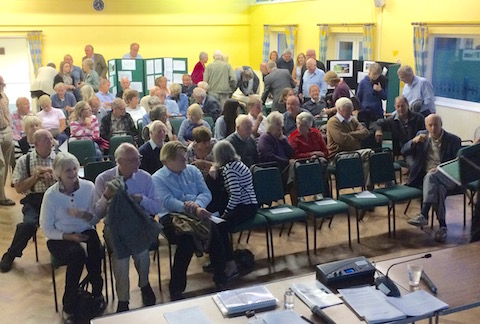 Abraham Lincoln
If given the truth, the people can be depended upon to meet any national crisis...
Abraham Lincoln
If given the truth, the people can be depended upon to meet any national crisis...
 Guildford news...
for Guildford people, brought to you by Guildford reporters - Guildford's own news service
Guildford news...
for Guildford people, brought to you by Guildford reporters - Guildford's own news service
Opinion: Are Lower Tier Decision Makers Worth Having?
Published on: 17 Jun, 2018
Updated on: 17 Jun, 2018
By Chris Dick
The Guildford Dragon NEWS asked a question in its May edition of the Effingham Eye: ‘Is there any point in villages having parish councils?’
Actually the question could have included borough councils. After all, the functions of both could be subsumed by their respective county councils at a fraction of the cost to ratepayers through economies of scale. And local representation on planning and other matters could be made through residents’ associations.
 This question about councils arose when the then Secretary of State Sajid Javid decided at appeal in favour of Berkeley Homes / Howard of Effingham School. His decision went against both Guildford Borough Council’s (GBC) and Effingham Parish Council’s (EPC) decision regarding 295 homes and a new school. And of course there could be even more new homes at Effingham as GBC is currently revisiting its site allocations in the light of the Wisley appeal result and Local Plan hearing.
This question about councils arose when the then Secretary of State Sajid Javid decided at appeal in favour of Berkeley Homes / Howard of Effingham School. His decision went against both Guildford Borough Council’s (GBC) and Effingham Parish Council’s (EPC) decision regarding 295 homes and a new school. And of course there could be even more new homes at Effingham as GBC is currently revisiting its site allocations in the light of the Wisley appeal result and Local Plan hearing.
But this article is not about whether the Secretary of State’s decision was right or about who won or lost. It is about whether, as the really big decisions are made at government level, it is worth having these lower tier decision makers at all. For example, it is reasonably clear that GBC had little part to play in the most recent Secretary of State’s planning decision over Wisley.
On the face of it, the Localism Act gave parish councils the power to create Neighbourhood Plans. But in reality it seems to have seduced some into putting forward potential development sites. This was a function that used to be undertaken by the borough council. A process that left the parishes free to defend their villages by saying ‘no’.
Now, once a parish has offered up a potential site, it is hard to say ‘no’ with any real conviction to a greater numbers of homes suggested by, for example the planning inspector or a developer. Prospective Neighbourhood Plan makers take note.
As Effingham Parish Councillor James Nicholls said in his letter to the Guildford Dragon (March 2018): “Very early on the Effingham Parish Council decided it was going to identify both sites and propose housing numbers. I strongly believe this is where we seriously dropped the ball.”
The debate was simply reduced to how many new homes.
The problem grew in significance when, in the case of EPC, it pre-empted the Local Plan and suggested sites that were outside its settlement area and protected by the green belt.
EPC thought that if it offered up a few homes on Effingham Lodge Farm that would protect the site from the Berkeley Homes / Howard of Effingham School planning application for more houses and a new school. Sadly as the aphorism goes: “The road to hell is paved with good intent”.
So, on the one hand, we are left asking whether there is any point in villages having local councils when government step in and overturn their decisions. And on the other hand, whether councils like EPC who apparently do not listen to or heed advice from their own councillor, residents’ association and other planing professionals, should perhaps be replaced in function by a residents’ association. But is it even possible to remove a parish council?
On September 11, 2015 EPC held a public meeting where it explained its new policy. The policy put forward a high sensitivity green belt site at Effingham Lodge Farm, for limited development. EPC claimed it was a strategy that would protect it from further development by Berkeley Homes. Many of those attending were incredulous and one resident, a former councillor, asked if they would resign if the policy failed. In response the architects of that policy offered their resignation if it failed.
It is worth noting that next door to Effingham in Mole Valley District Council and Elmbridge Borough Council the villages of both Bookham and Cobham decided not to form parish councils.
Also of note is that a parish council raises taxes whereas a residents’ association does not. In Effingham we pay up to about £100 per annum in local tax. Yet in Cobham residents can voluntarily pay just £8 per annum.
There is no space here to list what a borough council does for its communities. But, on planning matters like the parish councils, it boils down to nothing when the so-called independent (i.e. government) inspectors overturn local planning decisions.
And in closing, it’s interesting how offers of resignation are offered and later on so easily forgotten. As the Guildford Dragon quotes Steven Covey on its front page quote at present (top left, home page): “There are three constants in life… change, choice and principles.”
Responses to Opinion: Are Lower Tier Decision Makers Worth Having?
Leave a Comment Cancel replyPlease see our comments policy. All comments are moderated and may take time to appear. Full names, or at least initial and surname, must be given.
Recent Articles
- Notice: Come and Make a Christmas Cracker
- Benefits of Assisted Living Scheme Outweigh Harm to Designated Landscape GBC Planners Decide
- Letter: Councillor’s Statement is Misleading
- Two Unitary Authorities, One Elected Mayor – Most Likely Devolution Outcome for Surrey
- Notice: Guildford Music Society Concerts at URC
- Letter: Our National Parties Need a Reality Check
- Can You Help Find Wanted Man?
- Letter: Will New Bridge Really Speed Up Journey Times?
- Surrey’s Annual Housing Target Now at 10,981 – Council Pleas Ignored
- Long Sentences for Sara’s Murderers as Judge Describes Her Treatment as ‘Torture’


Recent Comments
- Nigel Keane on Two Unitary Authorities, One Elected Mayor – Most Likely Devolution Outcome for Surrey
- Paul Robinson on Dumped E-bike Provokes Questions
- Tim Down on Letter: Will New Bridge Really Speed Up Journey Times?
- RWL Davies on Letter: Our National Parties Need a Reality Check
- Alan Judge on Dumped E-bike Provokes Questions
- Roland Dunster on Letter: Our National Parties Need a Reality Check
Search in Site
Media Gallery
Dragon Interview: Local Artist Leaves Her Mark At One of England’s Most Historic Buildings
January 21, 2023 / No Comment / Read MoreDragon Interview: Lib Dem Planning Chair: ‘Current Policy Doesn’t Work for Local People’
January 19, 2023 / No Comment / Read MoreA3 Tunnel in Guildford ‘Necessary’ for New Homes, Says Guildford’s MP
January 10, 2023 / No Comment / Read More‘Madness’ for London Road Scheme to Go Ahead Against ‘Huge Opposition’, Says SCC Leader
January 6, 2023 / No Comment / Read MoreCouncillor’s Son Starts Campaign for More Consultation on North Street Plan
December 30, 2022 / No Comment / Read MoreCounty Council Climbs Down Over London Road Works – Further ‘Engagement’ Period Announced
December 14, 2022 / No Comment / Read MoreDragon Interview: GBC Reaction to the Government’s Expected Decision to Relax Housing Targets
December 7, 2022 / No Comment / Read MoreHow Can Our Town Centre Businesses Recover? Watch the Shop Front Debate
May 18, 2020 / No Comment / Read More













John Perkins
June 18, 2018 at 1:56 pm
The main selling point of Neighbourhood and Local Plans was that if you didn’t have one you wouldn’t be able to oppose development, which might then be imposed by central government.
Clearly, that happens anyway with “independent” inspectors persistently over-ruling local opposition. These Plans seem to be mostly about saving developers the time and expense of identifying suitable sites.
As Neville Bryan pointed out in these pages, the Localism Act was intended to fix a system that wasn’t broken. There’s fixing and then there’s fixing.
I wonder how many people are aware that the Local Government Ombudsman is unable to deal with complaints against the first tier of local government – parish and town councils – making them something of a law unto themselves.
Or that the 5% cap on council tax does not apply to parish councils, allowing them to raise the precept by any amount they wish.
This has led to some district councils dumping non-statutory duties on parishes, forcing them to raise their precept, but keeping the rise in council tax within the cap.
Neil Penno
June 20, 2018 at 1:45 pm
Many thanks for your incisive and informative article Chris.
May I add, in the case of Howard of Effingham School, is it proper that Effingham residents were charged £100 by EPC to stop its development?
I wanted a new school, yet my rates helped Effingham Parish Council to oppose it! Not happy.
John Perkins
June 21, 2018 at 1:03 pm
In support also of Neil Penno, there is another issue, more subtle and pernicious, with lower-tier government.
It’s that those with the time to indulge in being councillors tend to be older and wealthier.
Something like 95% of councillors are over 35 and 40% are over 65. Local government, especially at the parish level, is dominated by the old, wealthy and established and so has a natural tendency to favour their concerns. With the best will it’s not possible to represent others properly unless you share or at least understand their concerns.
A patrician attitude, “mother knows best”, is not the same thing as understanding – it’s almost the opposite. And wisdom doesn’t come with age, only greater knowledge, which is often misused.
Some might argue that younger people are not interested in politics, ignoring the fact the system is stacked against them.
They’re forced to busy themselves trying to get on with their lives and become established (and wealthy) in spite of the ever-increasing imposition of government. Coupled with a tendency for those already established to play “King of the Castle” it can be difficult for the young to get started.
It’s easy for those who need not worry about money to assume that £100 here or there is of little concern, but that money could be put to much better use – even if it’s only added to the mortgage payments. £100 here might push somebody to go elsewhere, which is good only for those already here as it improves their own status (only the wealthy can get in).
It can make for a vicious circle.
Jeremy Palmer
June 21, 2018 at 9:30 pm
So claim it back from the Howard. They were the ones who initiated the appeal in the first place after GBC planning rightly threw their plans out.